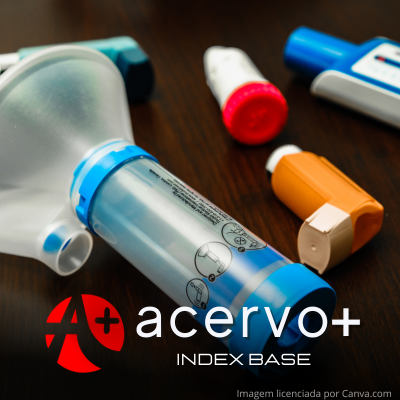Asma grave e seus fatores associados
##plugins.themes.bootstrap3.article.main##
Resumo
Objetivo: Realizar uma revisão sobre a gravidade da asma e seus fatores associados. Revisão bibliográfica: A asma é, por definição, uma doença crônica das vias aéreas cujas principais características são: inflamação crônica, obstrução variável das vias aéreas inferiores e hiper-reatividade brônquica, podendo ser classificada quanto a gravidade em STEP’s graduados de 1 a 5. A asma grave é a forma mais agressiva da doença inflamatória crônica das vias aéreas e possui um caráter complexo com inovações constantes na abordagem do manejo farmacológico com grandes avanços referentes à fenotipagem e ao uso de biomarcadores. Considerações finais: A asma é uma doença prevalente que quando descontrolada pode gerar graves emergências que requerem um manejo terapêutico correto e urgente para alívio dos sintomas e para um retorno eficaz da função pulmonar, controlando o estado geral do paciente e evitando as principais complicações como alterações permanentes no funcionamento dos pulmões, dificuldade para respirar levando a necessidade de ventilação, hospitalização e internação. Nesse sentido, o controle da asma grave e da asma de difícil controle é essencial para proporcionar qualidade de vida para pacientes.
##plugins.themes.bootstrap3.article.details##
Copyright © | Todos os direitos reservados.
A revista detém os direitos autorais exclusivos de publicação deste artigo nos termos da lei 9610/98.
Reprodução parcial
É livre o uso de partes do texto, figuras e questionário do artigo, sendo obrigatória a citação dos autores e revista.
Reprodução total
É expressamente proibida, devendo ser autorizada pela revista.
Referências
2. CLOUTIER MM, et al. 2020 Focused Updates to the Asthma Management Guidelines: A Report from the National Asthma Education and Prevention Program Coordinating Committee Expert Panel Working Group. J Allergy Clin Immunol, 2020; 146(6): 1217-1270.
3. ELLIOTT MR, et al. An Update on Monoclonal Antibody Therapy to Treat Moderate-to-Severe Asthma: Benefits, Choices, and Limitations. Am J Med, 2023; 136(8): 738-744.
4. GINA. Global Strategy for Asthma Management and Prevention, 2023; 1: 246.
5. KARDAS G, et al. Biological Therapies of Severe Asthma and Their Possible Effects on Airway Remodeling. Front Immunol, 2020; 11: 1134.
6. LOMMATZSCH M, BUHL R. The Treatment of Mild and Moderate Asthma in Adults. Dtsch Arztebl Int, 2020; 117(25): 434-444.
7. MANGARAVITI RB, et al. Fatores e impactos associados à asma e rinite alérgica na qualidade de vida – uma revisão da literatura. Brazilian Journal of Health Review, 2021; 4(2): 5131-5142.
8. NETO FARS, et al. Asma e seus aspectos fisiopatológicos: revisão integrativa da literatura. Research, Society and Development, 2022; 11(14): e186111436267.
9. PATEL SJ, TEACH SJ. Asthma. Pediatr Rev, 2019; 40(11): 549-567.
10. PEREIRA GNV, et al. Revisão de literatura e relato de caso: asma brônquica. Revista de Ciências Biológicas e da Saúde, 2023; 14-19.
11. PINTO RMC, et al. 2021 Brazilian Thoracic Association recommendations for the management of severe asthma. J Bras Pneumol, 2021; 47(6): e20210273.
12. PIZZICHINI MMM, et al. Recomendações para o manejo da asma da Sociedade Brasileira de Pneumologia e Tisiologia - 2020. J Bras Pneumol, 2020; 46(1): e20190307.
13. PONTE EV, SOUZA-MACHADO A. Asma grave no Brasil: do diagnóstico ao tratamento. J Bras pneumol, 2021; 47(06): e20210386.
14. RAMALHO I, BARROS R. Asma - Diferenças entre os gêneros. Salutis Scientia - Revista de Ciências da Saúde da ESSCVP, 2022; 14: 13-25.
15. RODRIGUES AS, et al. Abordagem geral da asma: uma revisão narrativa. Revista Eletrônica Acervo Médico, 2021; 1(2): e9129.
16. SANTINI JX, et al. Asma brônquica: uma revisão de literatura. Brazilian Journal of Health Review, 2023; 6(4): 18355-18365.
17. SILVA MTO, et al. Uso de imunobiológicos no manejo da asma grave em pediatria. Revista Eletrônica Acervo Médico, 2021; 13(9): e8150.
18. SOARES CR. Efeito da terapia com laser de baixa intensidade em estudo clínico e experimental de asma brônquica. Tese de Doutorado (Doutorado em Biofotônica) - Programa de Pós-Graduação em Biofotônica Aplicada às Ciências da Saúde. Universidade Nove de Julho (UNINOVE), São Paulo, 2018; 1: 102.
19. SULAIMAN I, GAUVREAU GM. Terapias antialarminas para a asma: para onde vamos a partir daqui?. J Bras Pneumol, 2023; 49(3): e 20230220.
20. WENZEL SE. Severe Adult Asthmas: Integrating Clinical Features, Biology, and Therapeutics to Improve Outcomes. Am J Respir Crit Care Med, 2021; 203(7): 809-821.

